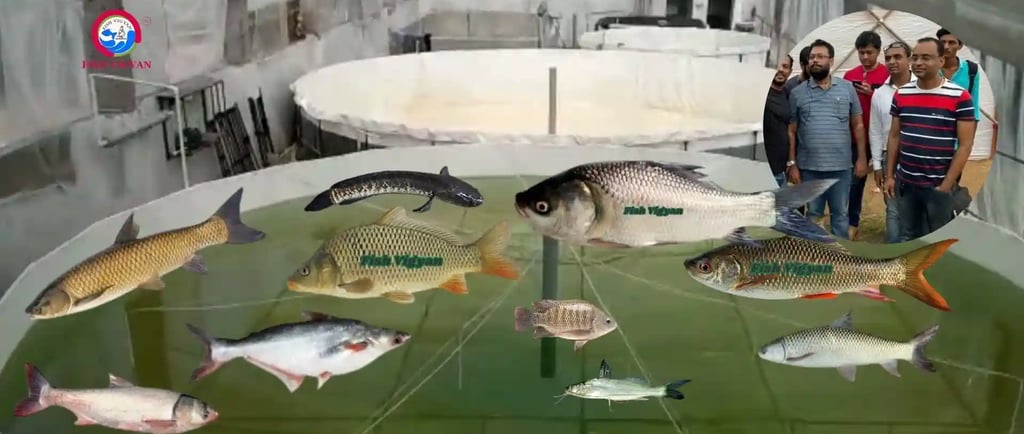Detailed Guide to Freshwater Fish Species for Farming in India, Bangladesh, and Pakistan
Freshwater fish farming in South Asia supports food security and the economy. This guide analyzes key fish species, covering growth, adaptability, feeding, and disease susceptibility.


1. Rohu (Labeo rohita)
Overview:
Rohu is a highly popular Indian major carp, prized for its mild taste and high protein content.
Farming Conditions:
Water Temperature: 25°C – 30°C
pH Level: 6.5 – 8.0
Stocking Density: 2–3 fish per square meter
Harvest Time: 12–18 months
Additional Information:
Difficulty Level: Moderate
Feeding Habits: Omnivorous; primarily feeds on plant matter
Disease Susceptibility: Prone to bacterial and fungal infections
2. Catla (Catla catla)
Overview:
Catla is a fast-growing surface feeder, commonly farmed in polyculture systems with rohu and mrigal.
Farming Conditions:
Water Temperature: 24°C – 30°C
pH Level: 6.5 – 8.5
Stocking Density: 2–4 fish per square meter
Harvest Time: 12 months
Additional Information:
Difficulty Level: Moderate
Feeding Habits: Planktivorous
Disease Susceptibility: Moderate; susceptible to gill and fin infections
3. Mrigal (Cirrhinus mrigala)
Overview:
Mrigal is a bottom-feeding carp that helps maintain pond health by consuming detritus.
Farming Conditions:
Water Temperature: 25°C – 30°C
pH Level: 6.5 – 8.5
Stocking Density: 2–4 fish per square meter
Harvest Time: 12–18 months
Additional Information:
Difficulty Level: Easy
Feeding Habits: Bottom feeder; consumes detritus and plankton
Disease Susceptibility: Low
4. Common Carp (Cyprinus carpio)
Overview:
Common carp is widely farmed due to its adaptability and rapid growth.
Farming Conditions:
Water Temperature: 18°C – 28°C
pH Level: 6.5 – 8.5
Stocking Density: 2–3 fish per square meter
Harvest Time: 10–12 months
Additional Information:
Difficulty Level: Easy
Feeding Habits: Omnivorous; eats plant matter and small insects
Disease Susceptibility: Prone to parasitic infections
5. Grass Carp (Ctenopharyngodon idella)
Overview:
Grass carp is a herbivorous species, commonly used for weed control in aquaculture systems.
Farming Conditions:
Water Temperature: 22°C – 30°C
pH Level: 6.5 – 8.5
Stocking Density: 1–2 fish per square meter
Harvest Time: 12–18 months
Additional Information:
Difficulty Level: Moderate
Feeding Habits: Herbivorous; feeds on aquatic plants
Disease Susceptibility: Moderate
Overview:
Silver carp is a fast-growing species, commonly used in polyculture systems.
6. Silver Carp (Hypophthalmichthys molitrix)
Farming Conditions:
Water Temperature: 20°C – 30°C
pH Level: 6.5 – 8.5
Stocking Density: 2–3 fish per square meter
Harvest Time: 8–12 months
Additional Information:
Difficulty Level: Moderate
Feeding Habits: Filter feeder; consumes phytoplankton
Disease Susceptibility: Low
7. Pangasius (Pangasianodon hypophthalmus)
Overview:
Pangasius is a highly profitable fish species farmed extensively for export markets.
Farming Conditions:
Water Temperature: 22°C – 30°C
pH Level: 6.5 – 8.5
Stocking Density: 4–6 fish per square meter
Harvest Time: 6–8 months
Additional Information:
Difficulty Level: Easy
Feeding Habits: Omnivorous
Disease Susceptibility: Moderate
8. Tilapia (Oreochromis niloticus)
Overview:
Tilapia is one of the most farmed fish worldwide due to its resilience and rapid growth.
Farming Conditions:
Water Temperature: 25°C – 30°C
pH Level: 6.5 – 8.5
Stocking Density: 2–5 fish per square meter
Harvest Time: 6–8 months
Additional Information:
Difficulty Level: Easy
Feeding Habits: Omnivorous
Disease Susceptibility: Low
9. Snakehead (Channa striata) – Murrel
Overview:
A carnivorous species with medicinal and commercial significance.
Farming Conditions:
Water Temperature: 22°C – 30°C
pH Level: 6.5 – 8.5
Stocking Density: 2–4 fish per square meter
Harvest Time: 8–12 months
Additional Information:
Difficulty Level: Moderate
Feeding Habits: Carnivorous
Disease Susceptibility: Moderate
10. Gulsha Tangra (Mystus cavasius)
Overview:
A highly preferred species in South Asian cuisine with a high market value.
Farming Conditions:
Water Temperature: 24°C – 30°C
pH Level: 6.5 – 8.5
Stocking Density: 3–5 fish per square meter
Harvest Time: 6–9 months
Additional Information:
Difficulty Level: Moderate
Feeding Habits: Omnivorous
Disease Susceptibility: Moderate
Conclusion
Freshwater fish farming in India, Bangladesh, and Pakistan relies on a diverse range of species suited for polyculture and monoculture systems.
⚠️ Caution: African catfish (Clarias gariepinus) is banned in India due to its invasive nature and environmental risks.
By selecting the right fish species and implementing best farming practices, farmers can achieve sustainable and profitable aquaculture operations.
